Noraseri – The End of Mourning Days
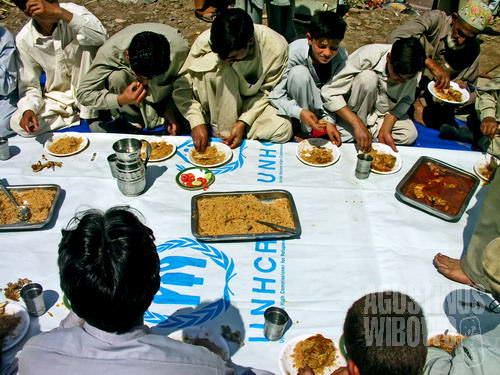
Mahfil, another party to commemmorate the 40th day after the death of Mister Hajji
April 2, 2006
The time passed very fast. When I came to Noraseri for the first time, the ground was dry and the hills were yellow. But spring had touched Kashmir, that the flowers had blossomed and the hills were carpeted by green rugs. It had been at least forty days since my first coming here. And the project of Danish Muslim Aid NGO had almost finished. The neighboring families had a queue to invite the personnel of the NGO to their house to have dinner or lunch. Three days ago it was Uncle Bashir’s family, then Doctor Shahab, then we had breakfast in Afaq’s house, and yesterday it was the turn of Farman Shah. The work had almost been completed. The dispensary was just some wood sticks, but now it had been walled and roofed by CGI sheets. Two days ago I came back from Muzaffarabad to make documentation of the NGO works in Pattika and yesterday it was the day of Harama and Noraseri. Most of the people were cooperative, except one woman who refused to put the emblem in her house saying that the CGI sheet was too weak, and another hajji shahab who refused to be photographed because the NGO didn’t give sheets to his married son.
The month had changed. It was 1 April. The April Fool. The plan was delayed for some days, but it had come to be realized. Most of the members of the team were leaving today. People from neighborhood came to give farewell prayers to Mahmood and friends, and sent them until the main road below the hill.
Today was the turn of Hajji Shahab family to invite us for dinner. Actually they had party by themselves, and didn’t need to prepare separate dishes for us. The family was going to celebrate the fortieth day of the death of Mr. Hajji, the chehlum of Hajji Karim Shah, and it was going to be the end of the mourning period. The family members, mostly women, also invited me to stay in their house for that night, so that I can observe the celebration of the chehlum.
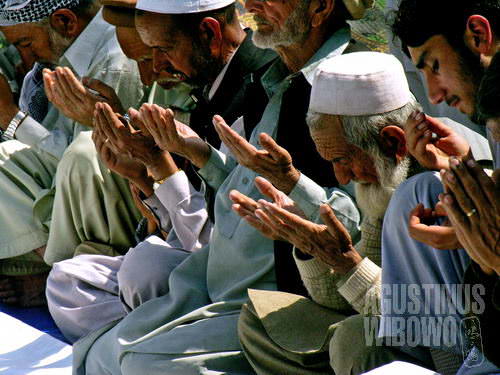
Prayers for the deceased
The mourning period was a full 40 days. Samera came back from her house in Lahore together with her two daughters and one baby son, to observe the period. The two daughters had at least a complete forty days of school absence. The family gathered in the father’s house to accept the guests who came to give prayers to the dead Hajji Shahab. It was not a complete sad period anyway. Mrs Karim was still working in her hospital, together with her daughter Hafizah. And actually the house was full of laughter and happiness. The children and grandchildren gathered together, and it turned to be a mess sometimes. For chehlum, all of the sons-in-law and daughters-in-law, and also brothers, brothers-in-law, etcetera etcetera, also gathered, that the little shelter home was very crowded. The house was full of grandchildren, babies who ran everywhere, spoiled everything, screamed every single minute, and fought with everybody. As Zabar (16), one of the Hajji’s grandchildren, described, the babies were all devils (satans).
At night, as usual, the daughters gathered together in the multi-purpose room. The laughter was even more happier, as there were more people coming for the celebration. Hafizah brought a woman, introduced me as her friend. The friend was actually sister-in-law. She brought another friend, and it turned to be her auntie. Family members were also friends. And it was the reason of the happiness. Somehow I missed the feeling of family gathering in my life. Our families had turned from big to small families just in some decades in our country. In my parents generation, having six or seven children was common. But now mostly Indonesian families were much smaller, one or two or three children. And many of my relatives were spread away, mostly to America where they worked as illegal workers for quick money. When I moved to China, I had relatives there. But the family planning in China had forced a family to have maximum of one child. Most of my uncles there just married without children. The nature had been changed. The world had changed. But in this part of the world, the change was at slower pace.
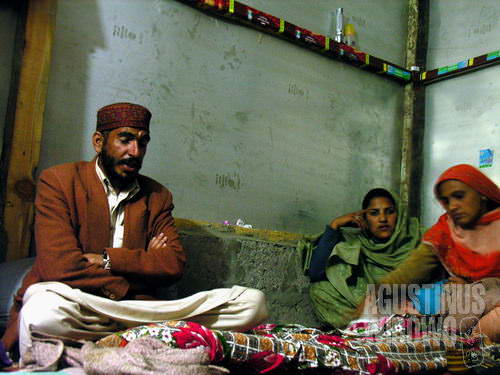
Chanting beautiful verses
At night, a man chanted Koranic verses and sang nat. The women in the room was more excited with photography than listening to the chanting seriously. I felt somehow the camera had troubled the man’s concentration. It was not my intention anyway. The women forced me to take pictures. Samera introduced her baby’s future wife – her sister’s daughter. Samera’s baby was only six month old, and the future wife was two years old. But the marriage, going to happen at least after 18 years, was planned already.
As what my impression of Hajji Shahab family was that the family always woke up very early. And specially in this occasion, the day was started as early as four, when the namaz prayer was started, and then Koran chanting for the dead Hajji Shahab. It was beyond my limit to wake up before seven.
And on that very morning, I dreamed about my father. The love that the Hajji Shahab’s daughters showed me, attacked my imagination. And in my sleep, I saw my father died. People said that if you dreamed someone died it meant that person would get longer age, blessing from God. Still I felt sad of that dream.
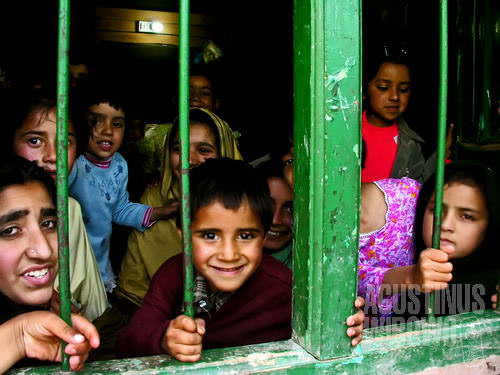
Children having fun with camera
The family was busy of preparation to welcome the guests. Cleaning up the house, cooking the food, putting air refresher (similar fired sticks used in Buddhist and Hindu prayers, but here just merely for the smell). Somehow my existence brought more mess to what already a mess. The women and the little babies, who were claimed as satans, were very enthusiastic of asking to be photographed. Tanzil, Mr. Hajji’s sole son, was quite annoyed that everybody was not in work, but instead posing for photos. The water didn’t come today, so some women had to climb the hill with the water pots to collect some enough for the day. Water problem had been emphasized these days in Noraseri, due to the broken pipe somewhere up.
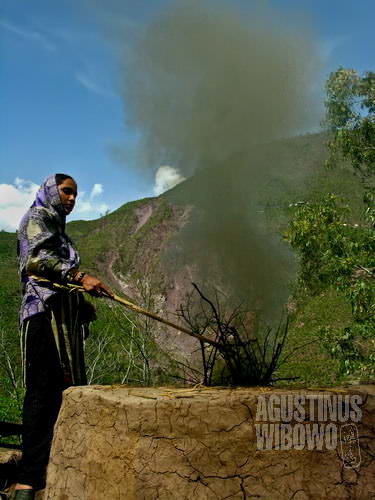
They have to cook outdoor
The Koran reading was started at 9:30. My existence there did bring some turbulence to the children who couldn’t concentrate. I chose to leave to other houses during the prayer.
The party was a big party. Then it came the chance where all guests sat together in the open air, the rubbles where the Hajji Shahab house had ever stood. The prayer was lead by an imam, he delivered the prayer in Arabic. Everybody put his palms up. The women of the family were in separated place. I didn’t see any women from other families. There were only male guests. Madam Hajji was very serious in her prayer. So were the other daughters.
Then the time for food was coming. And the party started. The Hajji family, whose people said as “Arabwallah”, people coming from Arab, were busy of serving the guests. The food kept flowing that they wouldn’t let the plates of the guests to be empty. Dozens of chickens were slaughtered for the occasion today, and the fate of the fury creatures ended up on the white plates mixed with rice and masala.
The chehlum, was a happy occasion.
Later on that day I went with the guys of our NGO, only three left, up the way to Indian border. Not that far, just a 20 km distance north to Noseri (the opposite name of ‘YesSeri’…. Sorry, a cold joke). But weather in mountain areas changed drastically, and when we arrived in Noseri it rained hard that we only stayed less than a minute and went back to Noraseri.


Leave a comment